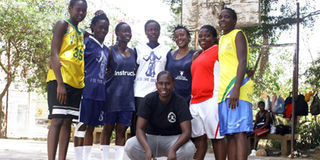Basketball of hope for Nairobi slum children

Photo/EMMA NZIOKA/NATION
Peninah Musyimi,, founder of Safe Place Organisation in Dandora Maili Saba, at the Kariobangi Catholic Church basketball court on February 28, 2012, where she trains the girl's basketball team.
He holds a ball close to his heart, as if his very life depends on it. Reagan Ochieng’ has a strong feeling that he will one day become a great basketball player.
At 14, Ochieng’, who is wearing a worn-out vest, shorts and shoes, looks much younger than his age-mates, thanks to his slight frame.
His mother died when he was still a baby, and he has never met his father, nor does he know who he is. His uncle and aunt took him in, and they have been looking after him since.
His guardians are poor, therefore paying Ochieng’s school fees, and providing him with necessities such as food and clothes is a constant struggle.
“Money is always a problem — my aunt and uncle have children, so there’s never enough,” he says.
For four years, the teenager has been faithfully attending basketball practice at the Safe Place Organisation (SPO) basketball court in Dandora, where children between seven and 16 are taught basketball.
When he is not at school, you will find this Standard Eight pupil at the court, with other children.
To him, this field has become a place to forget the problems that come with poverty, a place where he can afford to dream big.
Ms Peninah Nthenya Musyimi, 34, is the founder of SPO, Dandora, and Ochieng’s life story is no different from hers.
She was the first girl from Nairobi’s Mathare slum to graduate from university, and today works as a women’s rights advocate.
She grew up lacking school fees, proper amenities such as toilets, a nightmare for every child, especially the girl-child, who risks sexual harassment as she makes her way to toilets that are far away from her home.
She would do housework for her neighbours, and even though it was backbreaking work for a young child, they would pay very little.
“Our parents relied on odd jobs that paid little to provide for the four of us; it was a constant struggle,” says Peninah, who had to walk to school from her home in Mathare, to Kayole for the four years she was in high school.
Perform well she did
“But I was determined to perform well in school,” she says. And perform well she did.
She scored A- in her KCSE in 1995, and was lucky to be awarded a basketball scholarship at a nearby college, and later, a government bursary to pursue a degree in Social Sciences and Law at the University of Nairobi.
With support from the Dutch Embassy and Schools Without Borders, an NGO, Peninah set up the SPO in Dandora in 2008.
Her aim was to create a place where teenage girls in slums could engage in safe recreational activities and be mentored.
Even though her target is girls, SPO embraces boys such as Ochieng, since they too, face more or less the same challenges as the girls.
Besides the mentorship programme, the girls are offered life-skills and reproductive health training.
Her initiative is noted in The State of the World’s Children 2012: Children in an Urban World, released by Unicef, on Tuesday.
Ms Musyimi is in charge of administrative work and the basketball team, the game that changed her life.
“Several girls here stay away from school every few days because of their menstrual period, a factor that affects their performance in school,” Ms Musyimi says.
According to the report by Unicef, sexual violence is a daily reality for girls in urban public spaces.
Ms Musyimi echoes the report when she notes that places safe for women and girls are safe for everyone else.




